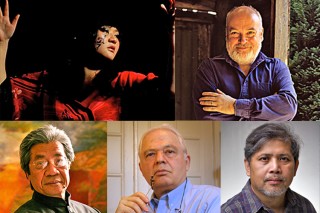Title

Clockwise from top left: Du Yun, Andrew Ford, Chino Toledo, Menachem Zur, and Chinary Ung are among the composers whose works will be played at the opening N.J.E. concert, on September 22.
The New Juilliard Ensemble is celebrating its 20th season this year, which is difficult to believe. These two decades have been marked by a constant stream of really superb new compositions, about 80 of which were composed for the group. The spotlight for the ensemble’s season opening concert, on September 22, falls upon Asia and the South Pacific, with works by composers with roots in the Philippines, Australia, Israel (yes, it’s in Asia!), China, and Cambodia.
Body
Having once programmed at MoMA a fine piece by the Australian composer and broadcaster Andrew Ford, I was really happy to receive his viola concerto The Unquiet Grave. Filipino composer Chino Toledo had come to my attention when I produced the 1996 Focus! festival (Around the Rim). His piece, from 2004, must have one of the longer titles on record: Mga Sulyap sa Simbahan ng Quapo Mula so Kalve Echague (Glimpses of Quiapo Church From Echague Street). With these two, the Southern Pacific was firmly represented on the program, and then distinguished Cambodian-American composer Chinary Ung wrote me about his recent piece for chamber orchestra, Rain of Tears, which commemorates the tsunami of 2004 and Hurricane Katrina in New Orleans. Having long admired Ung’s distinctive fusion of Eastern and Western, I hastened to get a score—and soon realized it would be an excellent complement to the Ford and Toledo pieces. A little wildness was still needed, however, and for that I turned to Impeccable Quake by Du Yun, a dynamic woman born and trained in China and now living in New York.
Meanwhile, one piece had been staring at me for more than a year. Cartoons, for vocalist and chamber orchestra, is by Israeli composer Menachem Zur. Inspired by the soundtracks of animated films, he composed nine imaginary dramatic scenes, united by interruptions of the sound of a cell phone, which acts as a kind of idée fixe. The “text” is a series of meaningless syllables created by the Israeli writer and performer Anat Pick. The skills needed to perform such a role are not commonly found, however, and I previously had not been able to imagine the right person for the solo role. In the past, it has only been performed by a woman, but then it occurred to me that master’s student Davone Tines, a bass-baritone, could do a splendid job with it—and it turned out he loved the idea. Fortunately, Zur liked the idea of using a male voice—and the all-Asian/Pacific program was complete.




